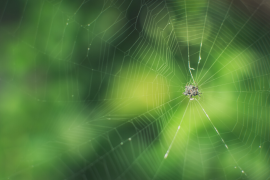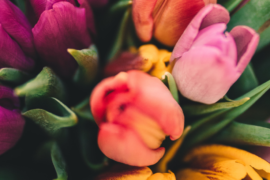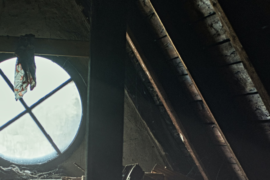Albert came from a synthetic embryo built from their parent’s stem cells. “It’s so much easier this way,” their mother had explained. But Yu is convinced Albert turned out all wrong because of it. He hardly speaks, and when he does, it’s to ask for tablets of Tylenol or melatonin—what kind of twelve-year-old child asks for unflavored, over-the-counter drugs like they’re candy? Something must’ve messed up while Albert’s embryo was self-developing its heart and brain structures no matter how accurately those scientists claimed the stem cell-derived embryos mimicked natural embryos developing in utero. Yu doesn’t buy it. Like ripening a tomato off the vine versus on the vine—they’re completely different products. Not to mention Albert hates tomatoes because they’re too acidic—no one in this household sharing the same blood hates tomatoes.
Yu is older than Albert by twenty years and is taking a break from work. She tells her parents she has decided to pursue a Master’s but she’s spending the time traveling instead. Her parents decided to have Albert back when she was deep in the throes of corporate slog, picking up on the unfinished projects her coworkers left behind before going on vacation. “Couldn’t you have gotten a dog?” she’d asked. “It’s not the same,” her parents replied.
Yu has just returned from a trip to Israel with five boxes of Halva and a jar of tahini to share with her friends when her parents invite her home to meet Albert. “Sure,” she answers, wondering what to buy him and figuring you couldn’t go wrong with a stuffed animal and sweet snacks—a bag of green tea Kit Kats and junk chocolates more other-flavoring than cocoa which she’d loved as a child. One day after arriving back at her apartment from Israel, she takes another flight home.
“Oh, Albert doesn’t eat sweets,” her mother says when Yu dumps her gifts on the family room table. “We can give the stuffed animal to our neighbors. They have a kid who might like it.”
“Well, what does Albert like?” Yu asks.
“He likes the rain,” her mother answers.
“Would he want to go to a water park?”
“No, not like that. He likes listening to the rain while indoors.”
Yu fishes for her bag stuffed with clothing and her computer. “I don’t have anything else to give him.”
“Albert wouldn’t want anything. It’s enough for you siblings to finally meet.”
She asks multiple times when she’ll meet him, but they constantly say “when he’s ready.” Fair enough. Maybe Albert is a night owl. Lots of kids are like that, staring at their tiny screens watching videos or playing games. She had been like that too in college before she realized the lack of sleep was blunting her brain, causing her to forget to turn off the lights or the stove or the sink.
But Yu doesn’t see Albert until the evening, long after the family dinner (minus Albert) and after her parents go to sleep. Albert creeps out of his room like a shadow. Yu only notices because she keeps all the lights on at night. She likes crisp clarity even when it’s not necessary. She likes the sense of place lest she encounter another wave of vertigo and convince herself she’s in a ditch of quicksand and moonflowers. When you live alone, mistaking your hardwood floor for quicksand leads to nail-scratched boards and high maintenance repair costs. Albert doesn’t say anything as he moves across the room, coming into full view under the light where Yu sits on the couch, computer propped on a pillow on her lap.
“Hi,” she says. Albert rummages around in the pantry, pulls out some sort of small wrappers, and faces her. On one hand are green packaged snacks of dried peas, fish and peanuts and, on the other, a package of ketchup.
“Who are you?” He asks, his long, wiry fingers crinkling the wrappers so there’s no break in sound.
“Yu, your sister, didn’t Mom tell you?”
“If it’s something important, she writes it down so there’s a record I can refer to.”
Yu can’t remember their mother writing anything down besides the characters of recipe names she’s afraid she won’t be able to find online. “What a shame it’d be to lose WaiPo’s Fotiaoqiang recipe. You remember tasting it right? Nothing like it,” her mother had said while trying to get Yu to learn the time-consuming process. “It doesn’t even taste that good,” Yu’d replied. “I’d rather have clam chowder.”
“Well, now you know,” Yu says. “I’m here to see you. It’s a full family gathering.”
Albert cocks his head to one side. “Family?”
“Yeah, what else do you think this is?” Yu places her computer down, her budding frustration demanding her full attention. She looks at Albert, his angular chin and cowlick and tiny mouth and popsicle limbs, and stands. Albert is slightly taller than her despite the age difference. Boys sprout all of a sudden, fiercely and intensely, and Albert grew up with all the milk and formulas Yu missed out on while her parents scrambled for liang piao to exchange for fifteen kilograms of rice.
“Stem cells don’t create families,” Albert says.
“So you’re not my little brother?” Yu crosses her arms. Albert tears open a bag of dried garlic green peas.
“I’m a vessel,” Albert says between bites, plopping one pea into his mouth at a time.
“A vessel that still needs food?”
“I’m a human vessel. Fuel is required for proper functionality.”
“Seems like a tasty form of fuel,” Yu comments. She’s not sure why Albert can’t just be fed rice, or why her mother chooses to spend all this money on Albert who can’t seem to tell the difference between peanuts and peas, only that they are a source of calories.
“Salty, yes. It has taste.”
Yu picks up her backpack. “Well, we’re supposed to be visiting the city tomorrow and are leaving early in the morning. Don’t forget to set an alarm,” she finally says. She heads to her bedroom, preserved in the state it had been when she left, all the books still scattered on the second-hand table from Auntie Zhou, the nail scratches marring the table surface, the imprint of words and numbers from textbooks inked into the wood.
Several studies report that the stem cells of synthetic embryos can interact poorly, sending incorrect mechanical signals and misleading the gene in charge of forming the neural tube. After brushing her teeth and slipping into bed, Yu scrolls through the articles on her phone, head buried under the covers, the screen glowing close to her eyes like it’s her pupils radiating photons rather than the display. She listens to the covers bristle against her shoulder as her chest rises and falls and wonders if Albert sleeps, if his lungs contract and expand the same way hers do: a dead giveaway that she’s alive.
Maybe she hadn’t been a good enough child so her parents wanted a do-over. That makes enough sense to Yu. She used to string stuffed animals in the curtains and coat hangers when they asked her to fold the laundry. She’d skip school the days PB&J was on the menu for the free student lunches, and after her parents found out, they demanded every teacher and custodian and cafeteria staff report her attendance directly to them. She’d sob when her father poured boiling water into instant ramen noodles, demanding to eat them dry like chips instead. She’d even run away once when her mother forbade her from joining cross country, convinced Yu’s bony knees would buckle and collapse. “Why can’t you be like normal parents?” Yu had screamed at them. “We are normal. Why are you so abnormal?” Her mother had shouted back. “Like I gave birth to a different species. Not human.” Bu shi ren. Maybe Albert is more human, what her parents have always wanted.
***
Yu’s mother believes you must go to the hole-in-the-wall temple to pray once a year. The temple is just a floor rented out from a tall, corporate building, the room decorated with Buddha statues and incense and cushions to kneel on. It’s positioned between the sixth-floor tax accounting firm and the fourth-floor facial salon, all of which share the same crickety elevator. They’ve delayed visiting the temple this year because of the rain and Yu’s father’s unwillingness to drive. It’s always a full day affair: prayer for one hour and “sightseeing” the rest of the day, what Yu’s mother considers a “big trip.”
Yu hated these trips as a child and would fake sick the day before. Fortunately, her mother took illness seriously and never forced Yu to join. Instead, her mother would make at least a liter of ban lan gen and ginger tea, expecting it all finished by the time they returned from the temple. Yu always poured it out the window even though ban lan gen cost their family a tiny fortune. Yu considered it a small price to pay to escape her mother’s insistence on walking every single block of the city and her father’s criticisms “why aren’t you like this?” whenever they passed university campus posters with smiling, white-toothed students labeled “Extremely Prestigious Program scholar.” And then they’d stop at this grimy Lanzhou lamian restaurant whose waiters sneered at her whenever she asked for the least spicy and oily dish because spicy oil induced such a strong gag reflex that she’d throw up for an entire weekend. “Oh, trying to lose weight?” They’d ask.
But this is their first outing together as a family of four so Yu tugs on a sweater and beanie to keep her ears warm. Albert is already seated in the car while their mother scrambles back into the house to grab fifty water bottles and a survival adventure’s worth of puffed sesame rice crackers.
“Oh no, Auntie Lin is supposed to deliver a box of bamboo shoots and tofu today,” Yu’s mother sighs.
“Can’t she just drop it off by the door?” Yu asks.
“Of course not! Someone might steal! Package theft is very common. All those people with fancy door cameras can’t even stop it.” She aiyahs to herself several times and goes, “Well, we can only leave in the afternoon then.”
Albert and Yu head back to the house. Yu taps his shoulder. “Hey, do you really want to go to the temple? I can tell Mom that you want to visit the lake and I’m driving you.”
“I’ve never been to the temple,” Albert replies, his pace not slowing as they approach the house.
“But do you want to go? You could spend your time doing whatever it is you’d prefer doing.”
“Mom says this is an important experience.”
“She always says that. Everything is important to her when it’s really not. You can’t keep getting hung up on everything, not everyone wants to do the same things and you can’t bend their demands to yours.” Yu pauses.
“She’s also not really your mom,” Yu adds, an afterthought to which Albert stops walking.
“I know,” he says. “But studies say stem cell-driven reactions for physical and neurological development lead to reduced damage on cells when faced with real-world stressors. So I’ll probably outlive her. And she thinks we’re family.”
Albert bends down to tie his shoelaces which have unraveled some time between boarding the car and hopping off. He moves like a robot, motions rigid and fingers trying to maneuver strings in proper loops only to get caught with uneven ends. Maybe this is the clumsiness of a growing boy.
“You’re not doing it right,” Yu says, bending down to help. As though Yu’s words spurred him on, Albert knots the wings of the laces twice and then three times until hardly any dangling strings remain.
“I know how to do it,” Albert replies after standing up and walking back toward the house. As he enters through the door, Yu’s mother emerges, eyebrows creased and lips pursed.
“What took you so long? It’s cold outside! That’s doubly not good for your body. Come in for some hot soup.” Yu’s mother waves Albert in. Yu is familiar with this “hot” soup, a watery mixture of adzuki beans, snow fungus, and lotus seeds with no taste because Yu’s mother won’t add salt never mind sugar. According to her mother’s pseudoscience, flavor weakens medicinal properties.
“That stuff doesn’t taste good. It just takes up room in your stomach and gives bad gas,” Yu warns after a pause, after Albert is too far away to hear, her words dissipating into the breeze along with the soft echo of the shutting door.
LUCY ZHANG writes, codes, and watches anime. Her work has appeared in Westerly, Apex Magazine, Split Lip Magazine, and elsewhere. She is the author of the chapbooks HOLLOWED (Thirty West Publishing) and ABSORPTION (Harbor Review). Find her at https://lucyzhang.tech or on Twitter @Dango_Ramen.
Like what you’re reading?
Get new stories, sports musings, or book reviews sent to your inbox. Drop your email below to start >>>
NEW book release
Direct Connection by Laura Farmer. Order the book of stories of which Mike Meginnis says there is “an admirable simplicity at their heart: an absolute, unwavering confidence in the necessity of loving other people.”
GET THE BOOK



